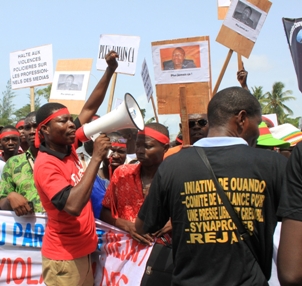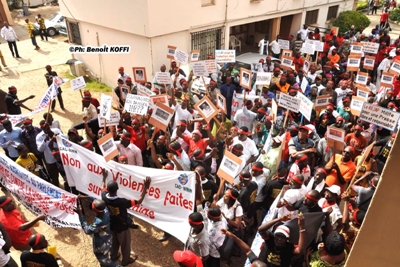Six associations of media professionals in Benin rallied Tuesday in Cotonou, the capital, in a protest march against what they called “the barbarity of security forces” against journalists.
This West African country is considered a showcase of democracy, but developments in recent weeks have tarnished a tradition of tolerance and respect for human rights, especially freedom of the press. President Thomas Yayi Boni was sworn in for a second five-year term last week in a ceremony boycotted by his challenger Adrien Houngbedji who has refused to recognize him on the grounds that the results of last month’s contested presidential elections were rigged.
“In recent political protests, journalists were chased, beaten, injured, and treated just like protesters,” said Jérôme Carlos, director of private station Capp FM and one of the leaders of the march Tuesday. “Security forces demonstrated incomprehensible zeal. We must protest against all these abuses.”
Carlos was referring to the March 24 police beating of reporter Séïdou Choubadé of the daily Le Nokoué. Choubadé was caught up in a demonstration as the opposition protested results of the presidential elections declaring Yayi the winner. Despite showing his press card to police, Choubadé was attacked. He was left with his face puffed-up, his upper lip cut, his hands injured, and his motorbike taken by officers.

Brice Houssou, the chairman of the Benin Union of Media Professionals, known as UPMB, denounced “the indiscriminate and gratuitous violence” against Moustapha Sèmiou Bashola, editorial secretary of the daily Les Scoops du Jour by security guards of the speaker of the National Assembly on February 18. “Security guards of the speaker and those of other politicians chased, beat up and roughed him up, as if he were a criminal,” Houssou said. Bashola was covering a public meeting of the ruling majority in the Assembly. UPMB reported that two of the speaker’s security guards later admitted to attacking the journalist after allegedly overhearing Bashola criticize the speaker outside the meeting.
Journalists also denounced the continuing “violence and battery” against journalists of state-run national media at public events they are supposed to cover, as well as the “bullying and discrimination of reporters by security officers and the central administration.” For instance, local media reported a March 11 assault on journalist Claude Adigbli of state news agency Agence Bénin-presse by a plainclothes member of the presidential guard after he approached the man to ask questions. The attack occurred on the last day of campaigning at a rally in support of Yayi.
Thus, wearing red headbands, and carrying signs with slogans like “No to beatings,” and “No muzzling of the press,” an estimated 400 members of the press and leaders of civil society took part in the march from the city’s Hall of Arts, Leisure and Sports to the headquarters of the official media regulatory agency known as HAAC, the ministry of communication and the ministry of interior, reported the UPMB. The marchers demanded that the government implement pledges made in a July 2009 meeting between the head of state and the associations of media professionals for a better future for the Beninese press.
“While cultivating our democratic garden, we must be careful of some thorns,” warned Carlos, the radio station director.
